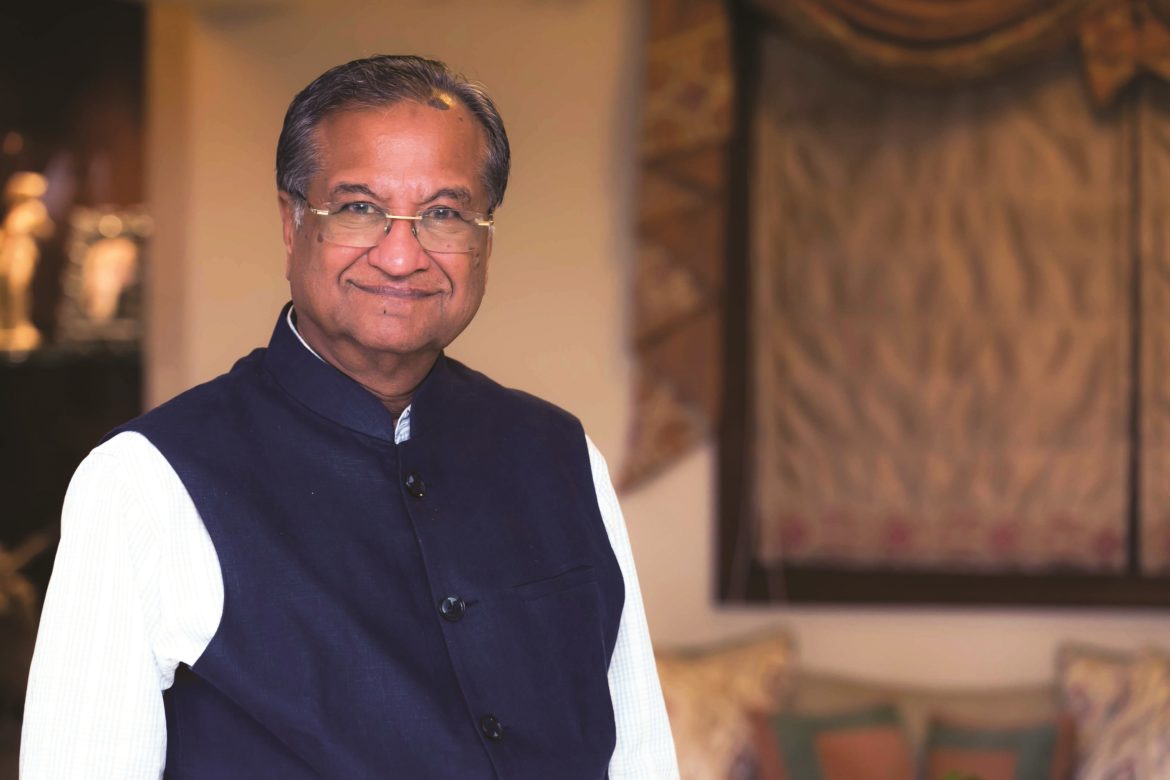Interviewers: Adil Khan, Samyak Shah
This interview was conducted as part of Department of Electrical Engineering’s “Alumni and Corporate Engagement” initiative. Check out the Department’s official student newsletter at this link.
Mr. Sharad Saraf is an alumnus of IIT Bombay (B.Tech. ’69 Elec. Engg. H2) and has also served as a member of the Board of Governors (BoG) of IIT Bombay.
He is the Chairman cum Managing Director of Technocraft Industries, an established multinational industrial house which he co-founded along with his brother in 1972. Mr. Saraf has headed several chambers of commerce and is also the current Chairman of the Board of Governors, IIT Jammu. He is also a founding member of the Electrical Engineering Student’s Association (EESA) and hence, we decided to talk to him about his experiences and also find out how life was at IITB in his undergraduate days.
As an alumnus, can you let us know what life was like at IITB in your days?
We were very carefree and relaxed. We did not have so many cultural and other events. The campus was lush green with a very pleasing ambience. There was a great bonding among the batch mates mainly because there were no other disruptions like mobile phone, laptops etc.
What kind of extracurricular activities did students participate in those days?
Our extra-curricular activities consisted of inter hostel, inter IIT sports competitions, various types of inter hostel activities, hostel day etc. We also produced very high quality professional plays which were staged in Tejpal Auditorium, Mumbai. There was great stress on sports.
How was the faculty – student interaction back then when the batch strength was lower?
Faculty – student interaction was very personal. The professors in the department knew almost all the students. The faculty members were ever ready to meet the students or resolve any issues.
How did the idea of forming EESA (electrical engineering student’s association) come about?
At our time when I was in my 4th year, I found that there was a very vibrant Chemical Engineering Students Association. So I wondered why we did not have a similar association for the Electrical Department. I discussed this with senior professors like Hariharan, Balakrishnan, Mukherjee among others and they were extremely kind and helpful.
What were the plans that you had while forming EESA and in what manner did the department support it?
The main plan was factory and plant visits that would enhance student’s knowledge of electrical engineering. For example, we visited Tarapur Atomic Power Station and a factory in Vadodara. There were also a few other visits. These visits were the source of bonding among members and we also had interesting lectures. The faculty was extremely co-operative and never said no for any program or event.
What were the factors that affected career choices in those days and what went behind you choosing the path of entrepreneurship?
In those days the most favorite choice was to go to the US for higher studies. Almost 70% of my batch mates went to the US. Those who stayed back did so for various reasons like family issues, financial conditions, family businesses or simply the desire to do something in the country. I could say that I was kind of a born entrepreneur. Even during my stay in the hostel, I had set up small commercial activities which were great fun and also well liked by my hostel batch mates. I came from a traditional Marwari community and hence I had it in my DNA. After graduating, I worked in a factory manufacturing electric motors, and then in 1972 I established my own business.
Looking back, how was the entrepreneurial scene in the 1970’s, especially at IITB as compared to what it is now?
In those days there was hardly any entrepreneurial spirit in our IIT students. There was no SINE or IT Sector. Hence almost all students preferred to go for professional jobs.
How did you familiarise yourself with taxation, personal finance and other things that are important in daily life but aren’t taught in the IITB classroom?
Many people have asked me this question. All non-technical services like taxation, personal finance etc. are available through chartered accountants and other professionals. I do not think there is a great need for any formal teaching of these subjects since there is not much creativity involved in them but general knowledge of taxation and personal finance comes on its own by experience.
Could you please illustrate how the IIT Bombay network and peer group help you throughout your career?
Till mid 1980s there was no IITB networking except for among close batch mates or hostel mates. There was no email, mobile phone etc. and hence networking was restricted to landline phones. However, in the 1980s I started the IITB Alumni Association (Bombay Chapter). This became quite popular and finally spawned IITBAA and PAN IIT Alumni Association. We organized a monthly alumni meet in the Institute of Engineers, Mahalaxmi on the last Saturday of every month. We also did a lot of events including organizing an annual day on the last Sunday of every year.
What would be your advice to students who are currently at IITB?
Basically all IITB students are quite creative, intelligent and dedicated. My advice is to remain focused, and have a CAN DO attitude. You will also find opportunity in every adversity provided you look for it intelligently.
We came to know that you are soon coming up with a book on your life experiences. Would you like to share anything about that?
Yes, my book is under printing now. It is called “Engineering Karma” and contains certain important events and experiences from my life which carry some message. There are also chapters about my experience at IIT Bombay, the first 4 years of my career and also my subsequent business journey.
